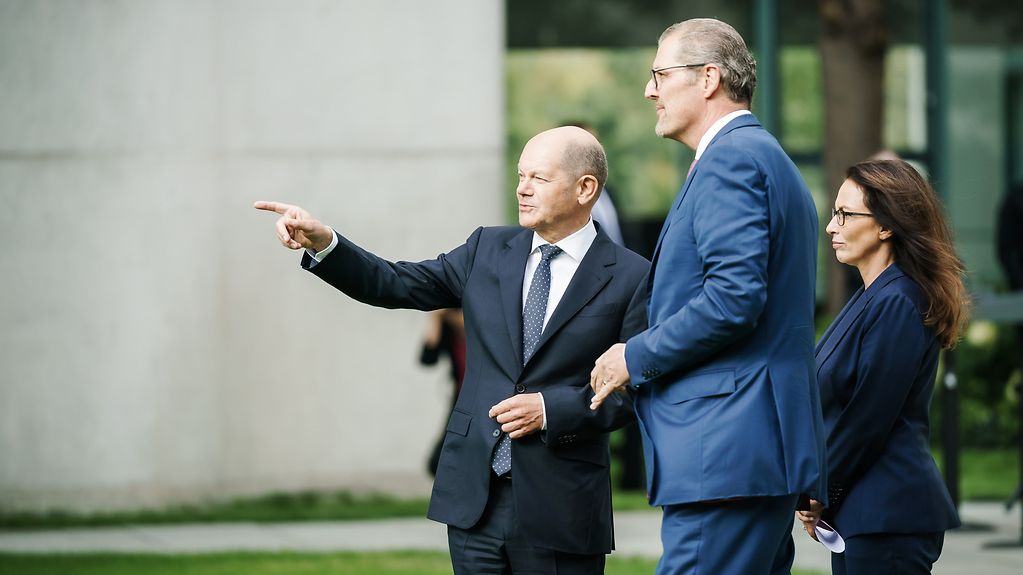Concerted Action
Following the second Concerted Action meeting at the Chancellery, Federal Chancellor Scholz said that the collective bargaining partners could agree on additional payments of up to 3,000 euros that would be exempt from tax and social security contributions. The goal of the discussions lead by labour unions, businesses, academic experts and politicians was to mitigate the effects of high inflation and loss of earnings.
4 min reading time

Federal Chancellor Scholz talking to DGB Chairperson Fahimi (right) and Employers’ Association President Dulger.
Photo: Federal Government/Denzel
On Thursday Federal Chancellor Scholz met labour union leaders and the heads of employers’ associations for the second meeting of the so-called Concerted Action group. The goal of this exchange was to find joint solutions to counteract the price increases caused by Russia's war, in particular of energy prices.
“We are making a great deal of money available to provide relief for employees, as well as for the German economy,” stressed Federal Chancellor Olaf Scholz after the meeting. He referenced the adopted relief packages worth 95 billion euros in total.
Additional payments to offer relief for employees
The Federal Chancellor reported that he had offered the collective bargaining partners the option to exempt one-off payments of up to 3,000 euros from tax and social insurance contributions. Such payments were a way to help employees make it through the crisis more easily, he explained, adding that this were merely an offer, as the Chancellery was not a venue for collective wage negotiations.
However, this measure might help employees, as both employees and companies were under pressure due to the high energy prices, the Federal Chancellor said. He said he was glad that the tradition of social partnership had lead Germany through many crises in the past, and that it was right for both sides to act in concert in trying times like these. “We will master these challenges,” the Federal Chancellor said. “We will make it through the winter.” The technical side was already being addressed by building LNG terminals, he said, with additional gas imports from Norway and other countries, through gas storage and by using coal to generate power. The Federal Chancellor expressed his conviction that Germany would also deal with the issue of prices successfully and said that the measures agreed upon by the Federal Government were designed to benefit those citizens who need help most urgently, as well as helping companies to secure jobs.
Programme to fight higher energy costs
He described the current situation as a threat to the existence of some companies. “The Federal Government is taking these concerns seriously,” the Federal Chancellor said. For this reason the Federal Government had started working on a programme designed to compensate for a part of the higher energy prices through funding programmes. However, he emphasised that lowering prices by changing the market design was the primary concern at the moment.
Expert committee holds discussions on market design
An expert committee for price design in the gas and heat market had been set up that is expected to present its results before the end of October. The committee was led by the representative of economists, Veronika Grimm, the leader of the labour union IG BCE, Michael Vassiliadis, and the head of the Federation of German Industries BDI, Siegfried Russwurm. A total of four members of the Concerted Action group were represented in the committee.
According to the preliminary information published by the federal statistics office, consumer prices rose further in August – the expected increase is 7.9%. This corresponds to an increase of 0.4 percentage points compared to the previous month. For many people this is a heavy burden in their everyday lives.
Social partners take responsibility
The head of the German Trade Union Confederation (DGB), Yasmin Fahimi, and Employers’ Association President (BDA), Rainer Dulger, expressed their appreciation for the option of additional tax-free payments and the creation of the expert committee.
Fahimi emphasised that solutions had to be found and implemented at a high speed, in order to make the third relief package a reality. The relief measures should ideally take effect in the current year. Concerning additional payments, the labour unions would be talking to the employer’s representatives as short-term measures would be needed. She also said that she was particularly pleased about the Labour Minister’s invitation to further elaborate short-time work benefits.
Dulger stressed that the talks were characterised by the consensus that the current situation could only be handled together. Companies were very worried, he said, and the drivers of inflation therefore needed to be brought under control quickly. He also mentioned his appreciation of the Federal Government’s plans to reduce cold progression that would increase the take-home pay of employees compared to their gross remuneration. Concerning the additional payments, he stressed that not all companies would be able to make such payments immediately or to the full amount, due to the current economic situation, and that it were therefore good to have a flexible, voluntary instrument.
Numerous measures to provide relief for households and companies
The three relief packages put together by the Federal Government worth a total of 95 billion euros will dampen the effect of the steep rise in energy prices that occurred this year. Measures include the 9-euro ticket, the fuel discount, the higher basic personal income tax allowance, a one-off payment of 200 euros for recipients of social security benefits, a child bonus of 100 euros, abolition of the Renewable Energy Sources Act levy from 1 July, two heating cost subsidies for people receiving housing benefits and the 300 euros energy price lump-sum disbursed in September.
The re-structured housing benefit and the new Citizens’ Basic Income that will replace “Hartz 4” payments will rise from 1 January 2023. At the same time, the Federal Government is doing all it can to ensure that energy supplies continue to function.